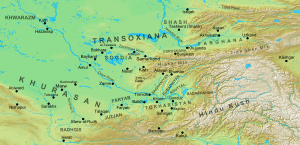Day of Thirst
| Day of Thirst | |||||||
|---|---|---|---|---|---|---|---|
| Part of the Umayyad-Turgesh Wars and the Muslim conquest of Transoxiana | |||||||
 Map of Transoxiana in the 8th century |
|||||||
|
|||||||
| Belligerents | |||||||
| Umayyad Caliphate | Turgesh Khaganate and Transoxianian allies | ||||||
| Commanders and leaders | |||||||
| Muslim ibn Sa'id al-Kilabi | Suluk | ||||||
The "Day of Thirst" (Arabic: ﻳﻮﻢ ﺍلعطش, Yawm al-aṭash) is the name traditionally given in Arabic historiography to a battle fought in 724 between the Turkic Turgesh khaganate and the Umayyad Caliphate on the banks of the river Jaxartes, in Transoxiana (in modern Tajikistan, Central Asia). The Umayyad army, under Muslim ibn Sa'id al-Kilabi, was campaigning in the Ferghana Valley when it learned of the Turgesh advance. Immediately, the Arabs began a hasty retreat to the Jaxartes, pursued and harassed by the Turgesh cavalry. Finally, after 11 days, the Umayyad army reached the Jaxartes, where it was caught between the Turgesh and the forces of the native Transoxianian principalities. Nevertheless, the Arabs managed to break through and cross the river to Khujand. The Umayyad defeat led to the collapse of Muslim rule over much of the region, which until ca. 740 remained disputed territory, with both the Arabs and the Turgesh fighting for control over it.
The region of Transoxiana (Arabic: Ma wara' al-nahr) had been conquered by the Umayyad leader Qutayba ibn Muslim in the reign of al-Walid I (r. 705–715), following the Muslim conquests of Persia and Khurasan in the mid-7th century. The loyalties of Transoxiana's native Iranian and Turkic populations and those of autonomous local rulers remained questionable, however, as demonstrated in 719, when the Transoxianian princes sent a petition to the Chinese and their Turgesh vassals for military aid against the Caliphate's governors. The Turgesh responded by launching a series of attacks against the Muslims in Transoxiana, beginning in 720. These incursions were coupled with uprisings against the Caliphate among the local Sogdians. The Umayyad governor of Khurasan, Sa'id ibn Amr al-Harashi, harshly suppressed the unrest and restored the Muslim position almost to what it had been during the time of Qutayba, except for the Ferghana Valley, control over which was lost.
...
Wikipedia
